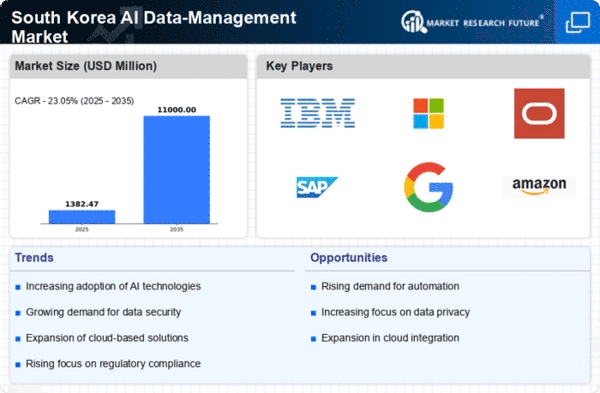Advancements in AI Technologies
Technological advancements in artificial intelligence are significantly influencing the AI Data-Management Market in South Korea. Innovations in machine learning, natural language processing, and predictive analytics are enabling organizations to manage and analyze data more efficiently. The integration of these technologies into data management solutions is enhancing their capabilities, allowing for real-time data processing and improved accuracy in data analysis. As businesses increasingly adopt AI-driven tools, the market is likely to expand, with projections indicating a potential growth rate of 18% annually over the next five years. This trend underscores the importance of continuous innovation in maintaining a competitive edge within the ai data-management market.
Government Initiatives and Support
The South Korean government is actively promoting the adoption of advanced technologies, including those related to the AI Data-Management Market. Initiatives aimed at fostering innovation and digital transformation are being implemented, with substantial funding allocated to support research and development in artificial intelligence. For instance, the government has earmarked approximately $1 billion for AI-related projects over the next five years. This support not only encourages local enterprises to invest in data management solutions but also attracts foreign investments, thereby stimulating growth within the ai data-management market. Such governmental backing is likely to create a conducive environment for technological advancements and market expansion.
Rising Demand for Data-Driven Insights
The AI Data-Management Market in South Korea is experiencing a notable surge in demand for data-driven insights. Organizations are increasingly recognizing the value of leveraging data analytics to enhance decision-making processes. According to recent statistics, the market for data analytics in South Korea is projected to grow at a CAGR of 15% from 2025 to 2030. This growth is largely attributed to the need for businesses to remain competitive in a rapidly evolving digital landscape. As companies seek to harness the power of data, the ai data-management market is positioned to benefit significantly, providing tools and solutions that facilitate the extraction of actionable insights from vast datasets.
Growing Importance of Data Privacy Regulations
As data privacy concerns continue to escalate, the AI Data-Management Market is witnessing a heightened focus on compliance with data protection regulations in South Korea. The Personal Information Protection Act (PIPA) mandates strict guidelines for data handling, compelling organizations to adopt robust data management practices. This regulatory landscape is driving the demand for solutions that ensure compliance while optimizing data usage. Companies are increasingly seeking ai data-management tools that not only facilitate data storage and processing but also incorporate features that enhance data security and privacy. The market is expected to grow as businesses prioritize compliance, potentially leading to a 20% increase in demand for data management solutions by 2026.
Increased Investment in Digital Transformation
The ongoing digital transformation across various sectors in South Korea is acting as a catalyst for the AI Data-Management Market. Organizations are allocating substantial budgets towards upgrading their data management systems to support digital initiatives. Reports indicate that companies are expected to invest over $5 billion in digital transformation efforts by 2026, with a significant portion directed towards enhancing data management capabilities. This investment trend reflects a broader recognition of the necessity for efficient data handling in driving business success. Consequently, the ai data-management market is poised for growth as enterprises seek to implement advanced solutions that align with their digital strategies.
















